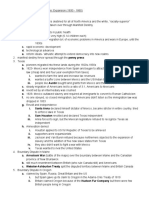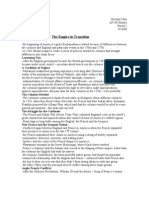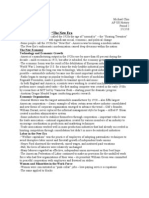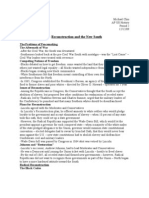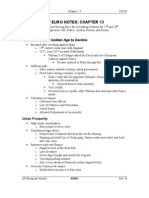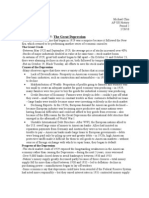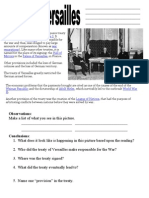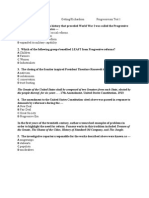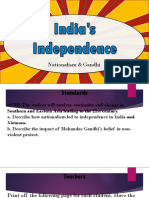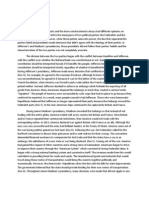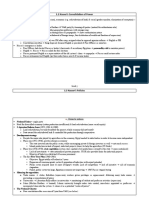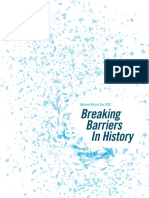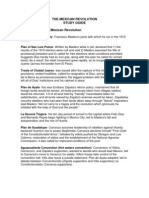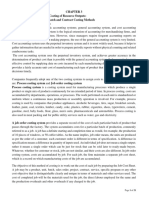0 ratings0% found this document useful (0 votes)
476 viewsAPUSH Chapter 41 Outline
APUSH Chapter 41 Outline
Uploaded by
Partyboy97This document provides a summary of major events and developments in America from 1992 to 2004. It discusses the presidency of Bill Clinton and his policy agenda, as well as political challenges faced during his terms. It then covers the 2000 election between George W. Bush and Al Gore, and key events of Bush's presidency including the 9/11 terrorist attacks and the wars in Afghanistan and Iraq.
Copyright:
© All Rights Reserved
Available Formats
Download as DOCX, PDF, TXT or read online from Scribd
APUSH Chapter 41 Outline
APUSH Chapter 41 Outline
Uploaded by
Partyboy970 ratings0% found this document useful (0 votes)
476 views5 pagesThis document provides a summary of major events and developments in America from 1992 to 2004. It discusses the presidency of Bill Clinton and his policy agenda, as well as political challenges faced during his terms. It then covers the 2000 election between George W. Bush and Al Gore, and key events of Bush's presidency including the 9/11 terrorist attacks and the wars in Afghanistan and Iraq.
Original Description:
APUSH Chapter 41 Outline from the American Pageant E. 14 Book.
Copyright
© © All Rights Reserved
Available Formats
DOCX, PDF, TXT or read online from Scribd
Share this document
Did you find this document useful?
Is this content inappropriate?
This document provides a summary of major events and developments in America from 1992 to 2004. It discusses the presidency of Bill Clinton and his policy agenda, as well as political challenges faced during his terms. It then covers the 2000 election between George W. Bush and Al Gore, and key events of Bush's presidency including the 9/11 terrorist attacks and the wars in Afghanistan and Iraq.
Copyright:
© All Rights Reserved
Available Formats
Download as DOCX, PDF, TXT or read online from Scribd
Download as docx, pdf, or txt
0 ratings0% found this document useful (0 votes)
476 views5 pagesAPUSH Chapter 41 Outline
APUSH Chapter 41 Outline
Uploaded by
Partyboy97This document provides a summary of major events and developments in America from 1992 to 2004. It discusses the presidency of Bill Clinton and his policy agenda, as well as political challenges faced during his terms. It then covers the 2000 election between George W. Bush and Al Gore, and key events of Bush's presidency including the 9/11 terrorist attacks and the wars in Afghanistan and Iraq.
Copyright:
© All Rights Reserved
Available Formats
Download as DOCX, PDF, TXT or read online from Scribd
Download as docx, pdf, or txt
You are on page 1of 5
At a glance
Powered by AI
Some of the key takeaways from Bill Clinton's presidency include reducing the federal deficit, passing gun control and crime bills, and presiding over a period of economic prosperity.
Major events during Bill Clinton's presidency included passing healthcare reform, reducing the federal deficit, passing gun control and crime bills, and being re-elected in 1996.
The Republican party launched an assault on Bill Clinton's presidency led by Newt Gingrich and the 'Contract with America'. They took control of Congress in 1994 and passed legislation reducing welfare.
Chapter 41 - America Confronts the Post-Cold War Era, 1992-2004
I. Bill Clinton: the First Baby-Boomer President
1. The 92 election saw the Democrats with Bill Clinton (an accused womanizer, drug user,
and draft runner) with Al Gore, Jr. by his side
2. The Democrats of the 90s decided to go with supporting growth, stalwart defences, and
a campaign against crime all the while working to revitalise the economy
3. The conservatives on the other hand, decided to focus on family values and called on
Bush again to represent them with J. Danforth Quayle at his side
o They declared that character matters and thus Clinton was ineligible to be
elected
4. Ross Perot decided to campaign as a third party candidate and garnered a good
19,742,267 popular votes but was crushed along with Bush by Clinton (370 to 168)
o The Democrats once again held the Senate and House
5. Congress and Clintons cabinet was now filled with more minorities and females than
ever, with people like Janet Reno, the first female attorney general and Donna Shalala,
Secretary of Health and Human Services, along with Ruth Bader Ginsburg, serving in the
Supreme Court
II. A False Start for Reform
1. Clintons start saw to him asking for acceptance of homosexuals in the armed forces
which was eventually reduced to the dont ask, dont tell policy which accepted gays
and lesbians, off the books
2. Hillary was put in charge of American health and medical care and when outed in
October of 93, was criticised heavily
o This failed plan reduced Hillary to a possible liability of sorts whereas she
couldve stood shoulder to shoulder with her husband as an equal political
presence
3. 1996-the federal deficit was reduced to its smallest in 10 years and 93 saw the Brady
Bill gun control law go into effect, which was named after James Brady, presidential aide
who was wounded at Reagans shooting
o In 94, a $30 billion anticrime bill was passed by Congress due to Clintons
persuasion
4. The World Trade Centre was bombed by a radical Muslim faction which resulted in six
casualties
o A federal building in Oklahoma was also bombed in 95 which resulted in 169
dead
o A violent gunfight also erupted in Waco, Texas when the government decided to
crack down on the Branch Davidians
1. Casualties included men, women, and children
o In contrast to the Americans of WWII, the government was trusted b its people
at this time
III. The Politics of Distrust
1. 94 saw Newt Gingrich heading the Republicans in an assault against Clintons failures as
a liberal with the conservative Contract with America
o Gingrich would become the Speaker of the House joining his fellow Republicans
that one the 53 incumbent seats and 8 new seats in the house
2. The Republicans overstepped their bounds however, by passing federal laws that
encumbered state and local governments without giving them new revenue
o They also made Clinton sign a bill that would reform welfare and slice deeply
into welfare grants
o Despite Clintons efforts to combat the conservatives ridiculous moves, the
Americans grew tired of the Republican actions such as Gingrichs proposal to
send welfare family children to orphanages
1. Congress even shut down in 95 since an adequate budget package
could not be compiled
3. Clinton continued his term in 96 when he won against Bob Dole, 379 to 159 with Ross
Perot once again coming in third
IV. Clinton Again
1. Besides FDR, Clinton was the only re-elected Democrat at the time
2. By taking moderate, middle ground, he managed to push back the conservative advance
o Clinton welcomed the Welfare Reform Bill
o Affirmative action was kept steady by him, speaking against the move away
from affirmative action by voters, but not taking action to prevent the move
3. Clinton had the good fortune of reigning as president during a period of economic
prosperity
o The ever-controversial NAFTA which reduced tariffs and lowered the trade
barriers between the countries of the North American continent was supported
by Clinton
o The World Trade Agreement which called for international trade barriers to be
reduced also gained Clintons support
4. Campaign finance reform became an issue, but neither Clinton nor the Republicans
acted on it, instead relying on words
V. Problems Abroad
1. Clintons usage of troops in Somalia and Northern Ireland were to little effect
1. Despite condemning Chinese violations of human rights, Clinton decided that
trade with the Chinese was too important to relinquish to punish the country for
its violations
2. Clinton also sent troops to NATO for peace-keeping in the former country of Yugoslavia
1. 20,000 were also committed to bringing Jean-Bertrand Aristide back his position
of power in Haiti
3. Clinton now adamantly supported NAFTA and erected a free-trade zone around Mexico,
the US, and Canada
1. In addition, he aided in the creation of the World Trade Organisation along with
sending $20 billion to Mexico in 95 to boost its economy
4. The president also oversaw a meeting between Yitzhak Rabin of Israel and Yasir Arafat
of Palestine at the White House, which was conciliatory in nature
1. Unfortunately, Rabin was assassinated two years after and hopes for peace in
the Middle East were dashed
VI. Scandal and Impeachment
1. With the Cold War over, the US was searching for a way to combat Communism with
more diplomatic means as well as expose the corruption in the CI A and FBI
2. Clintons second terms was plagued with Republican majority opponents in both the
House and Senate
3. In the end, it was the Monica Lewinski sex scandal that would get him impeached
o He had oral sex with the intern in the Oval Office and denied under oath any
participation since he didnt consider oral sex as sex
o This white lie led to his impeachment, the 2
nd
after Andrew Johnson
o Fortunately, the 2/3 majority vote was unable to be garnered by the
Republicans and Clinton fulfilled the rest of his term
VII. Clintons Legacy
1. Trying to save face, he tried to leave a proper legacy
o He created land preservations
o He created the patient bill of rights
o More teachers and police officers found employment under his term
2. Ultimately, Clinton was a moderate Democrat who strengthened the economy,
balanced the budget, and maintained that the government could not give and do
everything to the people
3. His sex scandal however, left a bad taste in the American publics mouth, creating a
national cynicism towards the politics of the proceeding years
VIII. The Bush-Gore Presidential Battle
1. The election of the new millennium was quite the romp
o Al Gore was chosen by the Democrats who decided to side with Clintons
successes
o Ralph Nader would be the one to represent the Green Party
o George W. Bush would be the Republicans pick
2. For once, there was extra budget, which begged the question: what do we do with it all?
o Bush proposed tax cuts, Gore proposed small tax cuts to bourgeois, with the
rest going to Social Security, Medicare, and the national debt, and Nader really
was just there to look pretty
IX. The Controversial Election of 2000
1. The results were razor close and ultimately confusing
2. It all came down to Florida
o Florida, being ranked 4
th
in number of electoral votes became the pivotal swing
state
o There was a tie in Florida, with Bush in the lead by a hair
o In this case, a recount was to be made
Bush won after the recount
X. Bush Begins
1. Bushs term began with his promotion of his childhood in Texas and his sweeping under
the carpet of his familys immense privilege
2. Bush would also take on issues that flared up from both the Democrats and Republicans
o America was to be taken from international programs that were fine with
abortion
o Social welfare programs that were based in religion were now being promoted
o Stem cell research, a scientifically viable option, was discouraged
o Bush managed to piss off loads of environmentalists with his legislature
o Bush made a massive $1.3 trillion tax cut and turned the extra money in the
budget into a whopping $400 billion deficit by 04
XI. Terrorism Comes to America
1. In an event that shocked the world, Muslim radicals rammed planes into the Twin
Towers on September 11, 2011
o Two went into the World Trade Centre and one into the Pentagon
2. In true Texas fashion, Bush declared the War on Terror and demanded that Afghanistan
fork Bin Laden over
3. The economy plummeted and anthrax attacks followed shortly after
4. Terrorism introduced a new method of combat that discarded the battlefield tactics of
the last century
o The Patriot Act was passed that restricted American private security
o The new Depart of Homeland Security was created to protect the nation
XII. Bush Takes the Offensive Against Iraq
1. Saddams time ran out along with Bushs patience, due to his refusal to comply with the
UNs inspections
2. The intelligence of the time supported that Saddam was indeed making WMDs, an
allegation to which he denied fervently
3. Bush decided to jump into action
o Bush looked to the UN for approval to take armed actions, but a number of
countries such as the French were hesitant
o In light of this, Bush decided to send his country in solo and approved armed
force in Iraq in October of 02
o Despite pleas from the UN for more time for inspections, Bush lay siege to
Baghdad which fell in a month, sending Saddam fleeing where he would be
found in a cave 9 months after
o Seizing the country was the easy work, but putting it back together would prove
to be troublesome
XIII. Owning Iraq
1. The Americans were received well by most in Iraq
2. The people splintered into different factions and insurgents would assault GIs and
American casualties rose to 1200 in 04
3. The Americans deployed there began longing for home
4. The objectives to fulfil in Iraq were as follows
o Erect and maintain Iraqi security
o Erect a democratic, free Iraqi government
1. Iraqi troops proved to be slow to create
o Fortunately, a new government came into being with restricted powers on June
28, 2004
5. This war became controversial in the States, dividing the people along the lines of
conservative and liberal
XIV. A Country in Conflict
1. A growing division among Americans also arose from these issues:
o Democrats were still sore about the results of the election in 2000
o The Patriot Act inflamed the Civil Libertarians
o Those against the war and pacifists accused the WMD reasoning as a ploy to
start the war
o Business giants such as Enron and WorldCom that kept dubious books were
apparently bloating the rich and pressing down the poor
o Social warfare was now over the issues of homosexuality and abortion
o Affirmative action was still an issue, forcing the SC To devise a mathetical
formula for undergrad minority admissions
XV. Reelecting George W. Bush
1. Bush was up for re-election in 04, running up against John Kerry
2. Now the main issue was in national security, with the secondary issues of education and
health not far behind
o The focus of the national security was issue was on the war in Iraq
o Bush planned to continue the American campaign there whereas Kerry wanted
to pull out
Kerrys actual position however, was a mess
Kerry was both a war hero from Vietnam and a protestor
He voted for armed action in Iraq and also voted against a military
spending bill
3. Kerry attacked Bushs incompetence in the Iraq dilemma
o He accused Bush of not having a plan at the initial invasion
o This attack would prove to be his undoing however, as Kerry never mentioned
any viable alternative
4. Although it was hardly landslide, Bush won with 286 electoral over 252
You might also like
- 16.1 Teens and TobDocument4 pages16.1 Teens and TobGabriel ParksNo ratings yet
- AMSCO Guided Reading Chapter 8Document9 pagesAMSCO Guided Reading Chapter 8Raven H.0% (1)
- The Gilded Age Was A Period of Economic Prosperity and Political Equality For All AmericansDocument1 pageThe Gilded Age Was A Period of Economic Prosperity and Political Equality For All AmericansCaleb He100% (1)
- Chapter 12 AMSCO NotesDocument4 pagesChapter 12 AMSCO NotesAlly CarrickNo ratings yet
- Chapter 4Document6 pagesChapter 4Michael ChiuNo ratings yet
- Teach Yourself Hungarian Zsuzsa Pontifex 2003 PDFDocument388 pagesTeach Yourself Hungarian Zsuzsa Pontifex 2003 PDFPartyboy97100% (1)
- General Journal: Date Account Titles and Explanation PR DebitDocument26 pagesGeneral Journal: Date Account Titles and Explanation PR DebitLaica Cardenio100% (3)
- Class Lecture Notes 28Document16 pagesClass Lecture Notes 28Kasem AhmedNo ratings yet
- Chapter 4 - The War For IndependenceDocument28 pagesChapter 4 - The War For Independenceapi-233545455100% (1)
- APUSH Chapter 32 NotesDocument5 pagesAPUSH Chapter 32 NotesphthysyllysmNo ratings yet
- Study Guide U3Document20 pagesStudy Guide U3Trần Phan Gia Thư100% (1)
- The Cold War 1945 The Cold War 1945 - 1991 1991Document13 pagesThe Cold War 1945 The Cold War 1945 - 1991 1991A Miguel Simão LealNo ratings yet
- Apush Cram KitDocument119 pagesApush Cram KitalludraspicaNo ratings yet
- Period 3 OverviewDocument2 pagesPeriod 3 Overviewapi-462339507100% (1)
- APUSH Unit 4Document8 pagesAPUSH Unit 4alan.daiNo ratings yet
- Apush Chapter 16-17 Study GuideDocument8 pagesApush Chapter 16-17 Study Guideapi-236296135No ratings yet
- Chapter 24Document6 pagesChapter 24Michael ChiuNo ratings yet
- Chapter 18 Notes (Brinkley)Document6 pagesChapter 18 Notes (Brinkley)Annie LeeNo ratings yet
- APUSH LEQ Writing GuideDocument12 pagesAPUSH LEQ Writing GuideCadenNo ratings yet
- Hitlers GambleDocument6 pagesHitlers GambleDanielle Worley TarverNo ratings yet
- Period 5 1844 - 1877 Review SheetDocument6 pagesPeriod 5 1844 - 1877 Review Sheetapi-4623395070% (1)
- APUSH WWII NotesDocument5 pagesAPUSH WWII NotesphthysyllysmNo ratings yet
- ISP 3 - 4 Unit 1 - The Treaty of VersaillesDocument25 pagesISP 3 - 4 Unit 1 - The Treaty of VersaillesValery Nyala100% (1)
- History CTA Part 3 Civil Rights NEA Student BookletDocument29 pagesHistory CTA Part 3 Civil Rights NEA Student BookletSahana BanerjeeNo ratings yet
- Chapter 6 Study GuideDocument3 pagesChapter 6 Study GuideScarlette MckayNo ratings yet
- Chapter 15Document5 pagesChapter 15Michael Chiu100% (1)
- APUSH Period 4 ReviewDocument3 pagesAPUSH Period 4 ReviewKylei CordeauNo ratings yet
- American Imperialism Primary SourcedDocument5 pagesAmerican Imperialism Primary Sourcedsahragranados44No ratings yet
- APUSH American Pageant Ch. 16 Review QuestionsDocument1 pageAPUSH American Pageant Ch. 16 Review QuestionsNickNo ratings yet
- The Gilded Age Review GuideDocument9 pagesThe Gilded Age Review Guidedulce vNo ratings yet
- Unit 3 Ap Euro Notes: Chapter 13: The Netherlands: Golden Age To DeclineDocument18 pagesUnit 3 Ap Euro Notes: Chapter 13: The Netherlands: Golden Age To Declinetrevor938728100% (1)
- Chapter 25Document5 pagesChapter 25Michael Chiu0% (1)
- AP European HIstory Study Guide 1918-1945Document11 pagesAP European HIstory Study Guide 1918-1945lastspectralNo ratings yet
- 2.midterm Review 2 - Practice ExamDocument14 pages2.midterm Review 2 - Practice ExamChristopher Bradley0% (1)
- World War I PdnsDocument13 pagesWorld War I PdnsJayson100% (1)
- Industrial RevolutionDocument22 pagesIndustrial Revolutionapi-294843376No ratings yet
- HistorycolonizationchartDocument3 pagesHistorycolonizationchartapi-293236165No ratings yet
- World History Study GuideDocument5 pagesWorld History Study Guideaayush986297No ratings yet
- Apsuh NotesDocument94 pagesApsuh NotesSama Coulson100% (1)
- New Deal 9Document9 pagesNew Deal 9jsnletargo0% (1)
- Chapter 11 ProgressivismDocument7 pagesChapter 11 ProgressivismAshley GettingNo ratings yet
- APUSH Study Guide Pack 2021 v2Document10 pagesAPUSH Study Guide Pack 2021 v2ear ringNo ratings yet
- Indian IndependenceDocument41 pagesIndian Independencekaranpreet singhNo ratings yet
- APUSH Chapter 27 and 28 NotesDocument7 pagesAPUSH Chapter 27 and 28 Notesphthysyllysm100% (1)
- APUSH Chapter 31 NotesDocument6 pagesAPUSH Chapter 31 NotesphthysyllysmNo ratings yet
- 8th Grade U S History Ngsss-Ss Pacing Guide Year at A GlanceDocument1 page8th Grade U S History Ngsss-Ss Pacing Guide Year at A Glanceapi-366325761No ratings yet
- Apush DBQ #1Document2 pagesApush DBQ #1alynapradhan100% (1)
- 1.2 Nasser's Consolidation of Power: ScrollDocument4 pages1.2 Nasser's Consolidation of Power: ScrollI LytssNo ratings yet
- CH 31 Sec 1 - Postwar Uncertainty PDFDocument5 pagesCH 31 Sec 1 - Postwar Uncertainty PDFMrEHsiehNo ratings yet
- The Treaties of WwiDocument10 pagesThe Treaties of WwiMagnolia SongNo ratings yet
- 2020 NHD Theme Book - Breaking BarriersDocument48 pages2020 NHD Theme Book - Breaking BarriersBMSNHDNo ratings yet
- Amended Unit 9 PacketDocument18 pagesAmended Unit 9 Packetapi-286657372No ratings yet
- The Mexican Revolution Study Guide Vocabulary For The Mexican RevolutionDocument26 pagesThe Mexican Revolution Study Guide Vocabulary For The Mexican Revolutionandrea_betancoNo ratings yet
- APUSHDocument4 pagesAPUSHpink123123No ratings yet
- Outline - CH 11 ApushDocument6 pagesOutline - CH 11 ApushshodantestNo ratings yet
- APUSH Chapter 18 NotesDocument6 pagesAPUSH Chapter 18 NotesphthysyllysmNo ratings yet
- APUSH Chapter 34 NotesDocument6 pagesAPUSH Chapter 34 NotesphthysyllysmNo ratings yet
- APUSH Year 1 ReviewDocument30 pagesAPUSH Year 1 ReviewLise RubleNo ratings yet
- Depth Study On GermanyDocument41 pagesDepth Study On Germanyuriel murphyNo ratings yet
- Unit 1 Study Guide ApesDocument2 pagesUnit 1 Study Guide Apesapi-326622735No ratings yet
- Lecture 6: When All Roads Led To Rome: Italy Before The Romans: The EtruscansDocument20 pagesLecture 6: When All Roads Led To Rome: Italy Before The Romans: The EtruscansPartyboy97No ratings yet
- Accounting Project 1Document16 pagesAccounting Project 1Partyboy97No ratings yet
- New Deal DBQDocument1 pageNew Deal DBQPartyboy97No ratings yet
- APUSH Chapter 37 OutlineDocument6 pagesAPUSH Chapter 37 OutlinePartyboy97No ratings yet
- PitchDocument3 pagesPitchn01621814No ratings yet
- Chapter 3 Costing Methods The Costing of Resource Output 2015Document21 pagesChapter 3 Costing Methods The Costing of Resource Output 2015Amha SeyoumNo ratings yet
- Physics Form 1 QuestionsDocument10 pagesPhysics Form 1 QuestionsOkumu KevinsNo ratings yet
- W: Jon P: Nydia Clip E: Behavior Behavior Percep-ons/A2ribu-ons Percep-ons/A2ribu-onsDocument2 pagesW: Jon P: Nydia Clip E: Behavior Behavior Percep-ons/A2ribu-ons Percep-ons/A2ribu-onsalina soareNo ratings yet
- United States v. Samuel Desist, Frank Dioguardi, Jean Claude Lefranc, Jean Nebbia and Anthony Sutera, 384 F.2d 889, 2d Cir. (1967)Document23 pagesUnited States v. Samuel Desist, Frank Dioguardi, Jean Claude Lefranc, Jean Nebbia and Anthony Sutera, 384 F.2d 889, 2d Cir. (1967)Scribd Government DocsNo ratings yet
- Usali 12 OverviewDocument6 pagesUsali 12 Overviewtaha.clientcenterNo ratings yet
- Model Proiect TransfrontalierDocument95 pagesModel Proiect TransfrontalierDorina TicuNo ratings yet
- ChanakyaDocument24 pagesChanakyahotrev86No ratings yet
- Unfair Labor PracticeDocument28 pagesUnfair Labor PracticeNicco AcaylarNo ratings yet
- Come As You AreDocument1 pageCome As You AreBryan Varela GonzálezNo ratings yet
- Sprinter 7G Tronic TransmissionDocument7 pagesSprinter 7G Tronic TransmissionRicardo Santo AntonioNo ratings yet
- Cleveland Animal Protective LeagueDocument2 pagesCleveland Animal Protective LeagueAndy ChowNo ratings yet
- Bibliografie (Sinteza) DionisieDocument6 pagesBibliografie (Sinteza) DionisieprofsimaNo ratings yet
- Gofamint 3rd & 4th Quarters ManualsDocument115 pagesGofamint 3rd & 4th Quarters ManualsVictor AndyNo ratings yet
- Policy Formulation and EvaluationDocument12 pagesPolicy Formulation and EvaluationJanice Inquiangco CalucagNo ratings yet
- Effects of Tardiness To The Students of City of Malabon UniversityDocument19 pagesEffects of Tardiness To The Students of City of Malabon UniversityPanget pangetNo ratings yet
- United States v. John Matera, Thomas Carbonaro, and Peter Gotti, 489 F.3d 115, 2d Cir. (2007)Document11 pagesUnited States v. John Matera, Thomas Carbonaro, and Peter Gotti, 489 F.3d 115, 2d Cir. (2007)Scribd Government Docs100% (1)
- Royal Dutch Shell PLC Case Study AS GeoDocument12 pagesRoyal Dutch Shell PLC Case Study AS Geothejanitor16100% (1)
- Ptolemy's CentiloquiumDocument22 pagesPtolemy's CentiloquiumZubyre Khalid100% (1)
- Antifungal DrugsDocument20 pagesAntifungal DrugsboeykhNo ratings yet
- Paper 23 PDFDocument188 pagesPaper 23 PDFN S Arun KumarNo ratings yet
- De JOYA Villanueva Residence Schedule of Construction ActualDocument1 pageDe JOYA Villanueva Residence Schedule of Construction ActualAdrian Marasigan ReyesNo ratings yet
- InagroveDocument5 pagesInagroveJV GamoNo ratings yet
- International Journal of Health Sciences: David Alejandro Navarrete SolórzanoDocument9 pagesInternational Journal of Health Sciences: David Alejandro Navarrete SolórzanoTesis y ProyectosNo ratings yet
- 05 Eagle Ridge V CameronDocument1 page05 Eagle Ridge V CameronBasil MaguigadNo ratings yet
- Graham Priest's Theory of ChangeDocument4 pagesGraham Priest's Theory of ChangeWilliam J GreenbergNo ratings yet
- PPC Semiotic TheoryDocument17 pagesPPC Semiotic TheoryBEATphNo ratings yet
- TE-Road User and Vehicle CharacteristicDocument7 pagesTE-Road User and Vehicle CharacteristicVaibhav PatelNo ratings yet



